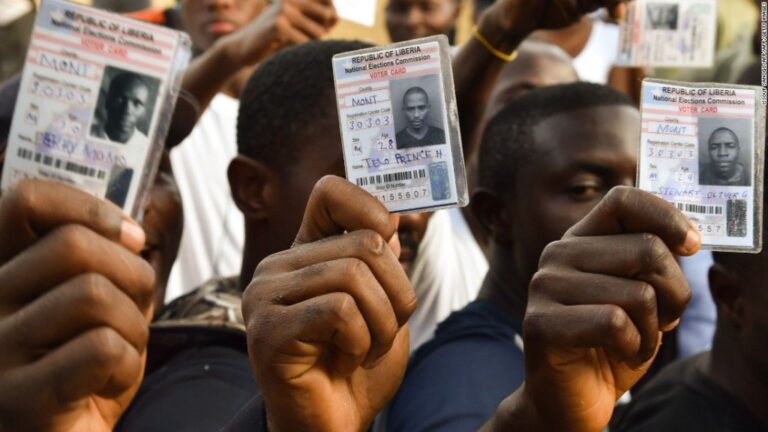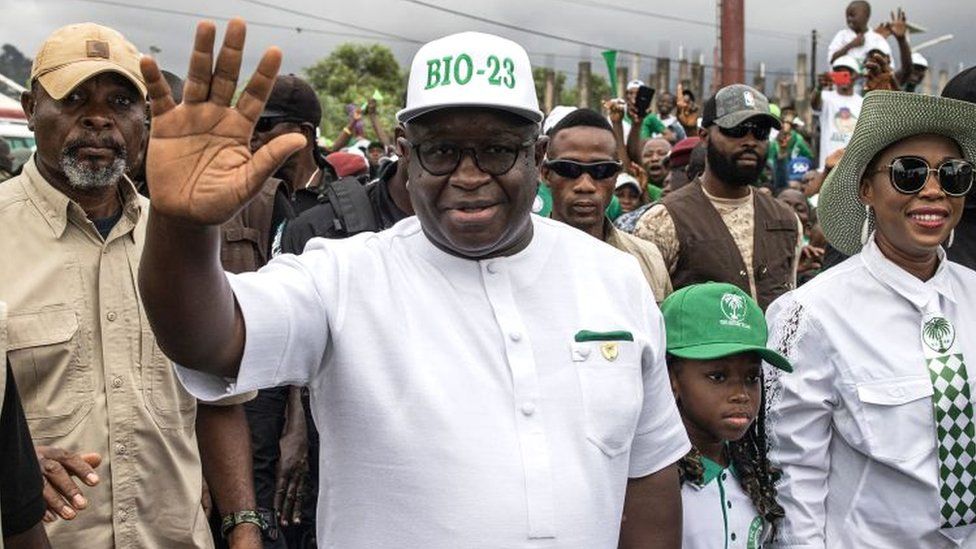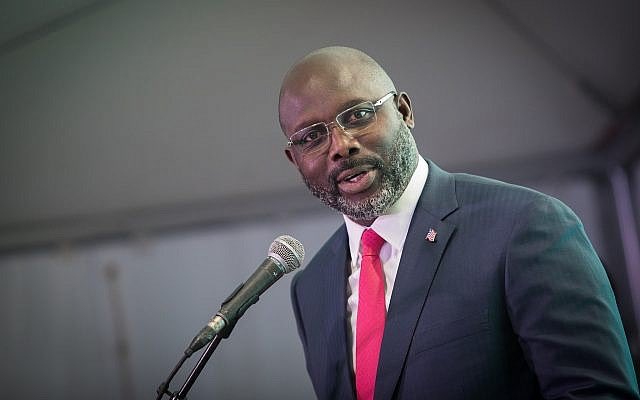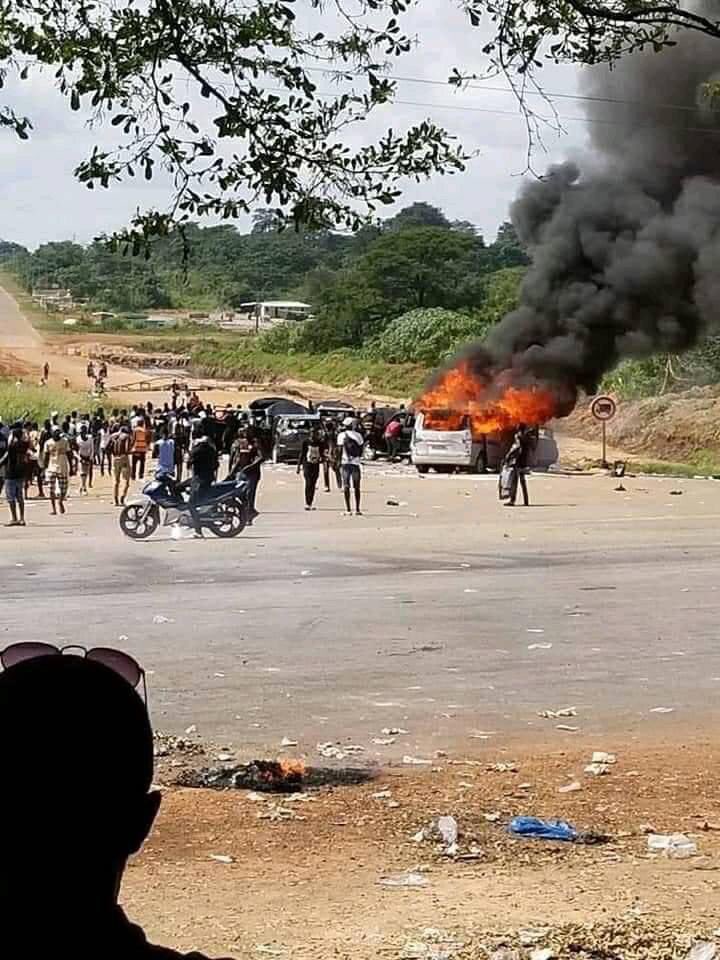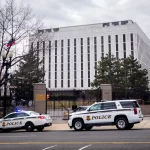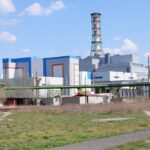Whoever wins election in Liberia, the loser or losers might not readily accept defeat that rises a bid of violence. In most African presidential elections, the losing candidate cries fault, justly or unjustly. An election dispute, as just occurred in Nigeria and Sierra Leone, could cause a problem and possibly instability. The only possible and effective way out for the current situation is conducting a fair, credible, and transparent election.
On October 10, Liberians will go to the polls to elect their next president, the fourth since the end of the civil war. The 2023 presidential and legislative elections are among the most crowded, anxiety-producing, and consequential in Liberia’s 176-year history.
The most likely favorites of presidential race are:
- Former vice president Joseph Boakai;
- Businessman Alexander Cummings;
- Human rights lawyer Tiawon Gongloe;
- President George Weah.
A candidate must win at least 50 percent plus one of the votes cast to win. If no party reaches that threshold, the two parties with the most votes in the first round proceed to a run-off election won by a simple majority. The incumbent, President George Weah, looks to be punished at the polls for rampant corruption, gross incompetence, extra-judicial killings, and a lousy economy. His Coalition for Democratic Change (CDC) party will face formidable hurdles in extending its hold on power beyond one term. A former senator who became president in 2018 after running in 2006 and 2011, he is hoping to win a second six-year term and claims he will win in the first round.
President George Weah is looking for a second mandate, keeping current Vice President Jewel Howard Taylor as his running mate. Weah is hoping that his infrastructure projects – including a number of roads and sports parks – will help the former football star and 1995 World Player of the Year get over the finish line. He is also touting policy victories, like the declaration of free tertiary education in government universities and the passage of dual citizenship laws.
Weah’s opponents and critics have highlighted increased inflation and his dismal track record in the fight against corruption as reasons not to vote for him. In 2022, the US Treasury sanctioned three top government officials for corruption, including the minister of state, the head of the Port Authority, and the solicitor general.
With elections set for October, Weah’s Coalition of Democratic Change – a coalition of three parties comprising Centre For Democratic Change, National Patriotic Party and Liberia People’s Democratic Party – has expanded its coalition by entering into alliances with a number of smaller parties.
The CDC is enjoying the advantages of being a governing party. according to local opposition, reinforced by state resources, and tribal loyalties, Weah will face a tough fight despite vociferous pushback from a disjointed opposition. The CDC has been boosted by the changing composition of the electorate over the last decade, most notably the increase in the youth population explosion amid they are spread throughout political forces.
The main opposition Unity Party (UP) seems the clear favorite of the over-65 age cohort, many of whom were active or worked in government during the dictatorship of Samuel Doe. Former vice president Joseph Boakai is viewed as experienced and wise, with a temperament that fits the job. While his age offers stability to the older generation and political elites, it is a turnoff to the ‘lost generation’ of Liberians, many of whom came of age during the civil war and are now yearning for generational change. The UP is poised to dominate the northern alliance – Lofa, Nimba, and Bong counties. The party has allied with former warlord-turned-Senator and US-sanctioned Prince Johnson and his Movement for Democracy and Reconstruction party, who promises to deliver populous Nimba. Still, it is becoming worrisome that Senator Johnson is a drag on the UP ticket due to his excesses during the war.
However, the so-called western cluster counties – Bomi, Cape Mount, and Gbarpolu will go to the UP spheres of influence. But, Margibi’s votes might be shared between Boakai, Cummings, Gongloe, and Weah.
The Unity Party’s Joseph Nyumah Boakai is aiming for the country’s top job after serving two terms as the vice president of Liberia (from 2006 to 2018) for President Ellen Johnson Sirleaf. He also served as minister of agriculture from 1983 to 1985 under President Samuel Doe. As a minister, he oversaw the programme to decentralise agriculture by creating regional hubs – a major project in Liberia, where many people are subsistence farmers.
Thus, Boakai has centred his campaign on agriculture, roads and education.
In the lead-up to the elections, Boakai’s Unity party has entered an alliance with former warlord-turned-Senator Prince Johnson and his Movement for Democracy and Reconstruction party who hold sway in populous Nimba county. He has also received endorsements from influential opposition politicians such as Senator Nyonblee Karnga Lawrence.
Boakai comes with extensive public sector experience, having previously served in managerial positions in the Liberia Produce Marketing Corporation (LPMC) and Liberia Petroleum Refinery Company (LPRC) in the early 80s.
In the 2017 election, Weah overwhelmingly defeated Boakai in the second round, winning 14 counties out of 15. Boakai only won his birth county, Lofa. Numerally, of the total votes cashed, Weah received 61.54%, and Boakai got 38.46. Boakai was vice president under President Ellen Johnson Sirleaf for 12 years. But in this election, he vows to win by selecting Nimba County Senator Jeremiah Kuonh. Nimba has the second largest voting population, second to Montserrado County in Liberia. Further, Senator Prince Johnson, also from Nimba, has endorsed Boakai’s presidency. He is politically influential and considered Nimba’s kingmaker and Godfather. Johnson is a former warlord. In 2017, he supported Weah in round two and helped in Weah’s massive victory.
The Collaborating Political Parties (CPP), an alliance of two opposition political parties, the Alternative National Congress, and the Liberty Party, will have to work harder to get to the second round. The CPP might reap high voting numbers in Rivercess and Grand Bassa counties.
Many pundits believe the CPP candidate, Alexander Cummings, former Coca-Cola executive and war and economic crime court advocate, cannot win. It is because people cannot imagine it happening. He has not ‘paid his dues’ as the other candidates have, which some see as good because he has not worked for any previous government before and is not a ‘legacy’ politician tainted by corruption.
He ran in 2017 as ANC standard bearer and received 7% of the total votes in the first round. ANC did not win a single legislative seat. But someone viewed his performance as better, considering his first time in a national election. For example, he took second place in Monserrado County, better than Boakai and Brumskine.
Businessman, philanthropist, and politician Alexander B. Cummings is running on his wide and varied private sector experience with nearly four decades of experience working in international business, highlighted by an almost two-decade career at The Coca-Cola Company. Unlike Weah and Boakai, Cummings was born to middle-class parents. But like Boakai, he graduated from CWA. Cummings did his university education in the US.
Cummings has made growing the economy his flagship issue. He has also shown significant support for a war and economic crimes court, providing credit financing for businesses and investing in agriculture and infrastructure.
But he may need a miracle to secure a spot in the coveted second round. He has a loyal caravan of young professional women supporting him because they “believe in his ability to improve the economy and create jobs,” so they gave him the moniker “Fixer 1,” plastered on their social media pages.
Many voters love Cummings and see him as the only candidate with the international experience and connections to lure top-flight investors to Liberia. Still, he has a likeability deficit that is problematic to overcome. So, Cummings must lead a robust ground game to knock out Boakai or Weah in the first round to have a chance, but some voters need to be humbler about casting their vote for him.
UP and ALP left CPP that points on division of Liberian opposition. Moreover, LP has split. One faction headed by Senator Nyongblee Karnga Lawrence supports Boakai. ANC and the legally recognized section of LP chaired by Musa Bility remained in the CPP and backed ANC’s leader Alexander Cummings. Recently, ALP has withdrawn its support to Boakai. The party’s action could affect the Boakai election. Its political leader, Benoni Urey, a businessman considered a millionaire in Liberia, has been a key Boakai backer. He now calls Boakai a betrayer and a tribalist.
CPP considers itself as the alternative to CDC and UP. It views that both parties have ruled Liberia without tangible outcomes and caused suffering and abject poverty. They have spoiled the country, “making the same mistakes and expecting a different result,” says CPP’s leader Alexander Cummings.
Like UP, the party accuses the administration of corruption and holds that Liberia needs fixing. CPP will fix the country. Hence, it calls Cummings and his running-mate Charlene Brumskine fixer one and two, respectively. Upon becoming president, the administration will take a different approach involving macroeconomic restructuring and stabilization. The CPP administration will increase the national budget to $1 billion. The government will use a more significant part of the budget for national development. “I am ready to fix the country,” Cummings repeats.
Boakai’s UP must taper its over-confidence, or some may say arrogance. It is understandable why many of his supporters cannot stomach the thought of a Weah second-term presidency, and they believe the UP is the only bulwark against an incompetent Weah being reelected. Many others are operating under a twisted assumption that Boakai will vacate the presidency mid-way into his first 6-year term. Still, a premature victory is not helpful.
President Weah still garners a cult-like following because of football nostalgia, but many voters believe he is unfit to govern. So, an outright CDC victory is unlikely; therefore, a palpable fear looms over the country that Weah and his CDC will cheat, which will be a grave mistake that will unquestionably plunge the country into chaos and lead to unrest.
However, I must warn you that there may be a “social desirability bias” going on as well – the idea that voters will tell anyone asking whatever reason they think will reflect positively upon them. Many people won’t publicly admit they are voting for Weah. A Weah victory may be unimaginable to many, but it is not impossible. The outcome of this extraordinary election will not be based on crowd sizes and social media chatters but on the so-called “silent voters.”
While the CDC maintains a high enthusiasm level in many ethnic enclaves in metropolitan Monrovia, at the same time, making inroads in large population centers in the southeast – Barclayville, Greenville, Zwedru, and Harper – Cummings may have the edge. Weah is undoubtedly on his knees, begging for votes in River Gee, Grand Gedeh, Sinoe, Maryland, and Grand Kru counties. Montserrado is seen as the ‘elephant meat,’ and all parties will reap some spoils.
One thing is sure; parties will need more votes for an outright win. Therefore, the two likely candidates for the second round may be CDC’s Weah and UP’s Boakai, setting the stage for a fierce battle. However, Cummings and Gongloe are the proverbial “dark horses” in this race and should not be written off. Both men can rise to the second round. Prominent human rights lawyer, law professor, and politician Tiawan Gongloe has a reputation for being upright and is running on an “anti-corruption” ticket. Gongloe is a native son of Nimba. His candidacy could take significant votes from the county and make Nimba competitive.
In his early years, Gongloe served as a student leader and later as an activist. In 1983, he, along with others, founded the Liberian People’s Party (LPP). Gongloe also comes with public sector experience. He was appointed as Liberia’s first post-war Solicitor General after Ellen Johnson Sirleaf assumed office in January 2006, and from 2009 until late 2010, Gongloe served as Labour minister.
The optics of hosting massive rallies by all four political parties have been impressive. Unfortunately, the various campaigns have relied too much on anecdotal evidence, like crowding streets and stadiums, and unscientific social media and radio polls to measure progress and have been lulled into a false sense of winning.
Many political parties have assumed, often wrongly, that the echo effect of being surrounded by big, boisterous crowds of already converted voters automatically translates into victory. But how they turn those large crowds into votes for their candidates may be the strategy that wins the election.
Apart from the candidates and their campaigns, the context of this election is mixed but probably nets out as a slight opposition advantage. After a decade of the UP running the country with no sustainable improvement in people’s circumstances and the CDC’s spectacular failure at governance, voters are hungering for someone different – whoever that might be.
If Cummings gets to the second round with either Boakai or Weah or Gongloe, he will defeat them. Candidates may be unable to beat Cummings in the second round because he will have the momentum and the money. The key for him, though, is getting to the run-off, which looks like a tall order.
Gongloe is the “dark horse” candidate in the race. A prominent human rights attorney, law professor, and politician, Gongloe of the Liberia Peoples Party (LPP) may not be the most charismatic presidential candidate, but that’s precisely what many political insiders want. Gongloe does not cause controversy and is an anti-corruption and rule-of-law campaigner, but that will not be enough to win. What he lacks in charisma, he makes up for in name recognition, experience, and uprightness.Gongloe also comes with public sector experience. He was appointed Liberia’s first post-war Solicitor General during the Ellen Johnson Sirleaf administration and was instrumental in prosecuting and sending former president Charles Taylor to the Hague.


